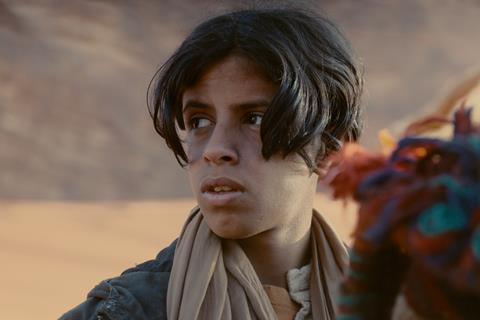A teenager develops a love of camel racing in this Saudi Arabia-set coming-of-age drama

Dir: Abu Bakr Shawky. Saudi Arabia, Egypt. 120mins
Nothing comes between a boy and his camel in Hajjan. Abu Bakr Shawky’s handsome desert adventure has a thoroughbred pedigree that stretches back through countless takes on the special bond between humans and animals, from National Velvet (1944) to Lean On Pete (2017). The camel-racing backdrop and picturesque Saudi Arabian locations add some fresh touches to a familiar formula, creating a wholesome coming-of-age drama with modest popular appeal.
A wholesome coming-of-age drama with modest popular appeal
Premiering at Toronto, Shawky’s second feature (following 2018’s Yomeddine) focuses on teenage tailor Matar (Omar Al Alatawi) and his devotion to the camel Hofira. Matar is enthralled by tales of legendary jockeys from the past and the history that has grown up around the Saudi city of Safwa, and the Great Safwa Race. His older brother Ghanem (Azzam El-Nemr) is set to compete in the Valley Race with the camel Barak; this is where they first encounter Jasser (Abdulmohsen al Nemer), a man who will do whatever it takes to win the Great Race.
A tragedy leaves Hajjan on his own and Hofira in the possession of Jasser – to protect the camel, Hajjan is obliged to work for a man he has come to despise. All the traditional elements are here, from a heartless owner to a sadistic trainer, a hunger for revenge, galloping beasts in tightly contested races, a friendly rivalry among the community of camel jockeys and the way events move inexorably towards a day of reckoning at the 2023 Great Race.
Shawky and fellow screenwriters Omar Shama and Mufarrij Almajfel bring some less predictable elements to the story. Jasser is established as Matar’s ruthless nemesis; his sneering looks, arrogance and velvety villainy would not be out of place in a Victorian melodrama. Gradually, however, he is revealed as a more sympathetic figure as we understand the pressures placed on him and his crippling desire to win at all costs. Eventually, there are interesting parallels between Jasser and Matar as outsiders, trying to emerge from the shadows of what their older brothers had achieved. Female characters including Jasser’s wife Sara (Alshaima Tayeb) and mysterious jockey Majd (Toleen Barbood), although secondary, are used throughout to directly challenge the assumptions of a traditionally male world.
Through do-or-die races, setbacks and betrayal, Hajjan becomes the story of Matar’s attempt to navigate his own path through sometimes conflicting advice on what it means to be a man. He grows to respect the mantra that “a real man knows what is right and always does it” and stays true to that, even when it requires the sacrifice of his own ambitions.
Cinematographer Gerry Vasbenter uses the piercing desert light to enhance the visual appeal of the film, adding contrast with scenes of snow swirling through the desert mountains, glowing campfires where stories are exchanged and starry night skies. Shawky and Vasbenter stage the camel races for maximum thrills, building the excitement through multiple angles and clever editing as trainers and owners keep pace with the riders. Amine Bouhafa’s sentimental, sweeping score works hard to push the emotions, especially in some of the rousing race sequences.
Newcomer Omar Al Atawi is rather bland in the central role of Matar but there are some characterful turns from guest star Ibrahim Al Hasani as paternalistic camel owner Abed, and Raed Alatawi as the commentator whose enthusiastic race reports are designed to keep everyone at fever pitch.
Production companies: Inthra, Film Clinic, The Imaginarium Films
International sales: Film Constellation edward@filmconstellation.com
Producers: Mohamed Hefzy, Majed Z. Samman
Screenplay: Omar Shama, Muffarj Almajfel, Abu Bakr Shawky
Cinematography: Gerry Vasbenter
Production design: Nasser Zoubi
Editing: Sarah Peczek
Music: Amine Bouhafa
Main cast: Omar Al Atawi, Azzam El-Nemr, Abdulmohsen al Nemer, Ibrahim Al Hasawi















![[L-R]: Amanda Villavieja, Laia Casanovas, Yasmina Praderas](https://d1nslcd7m2225b.cloudfront.net/Pictures/274x183/6/4/1/1471641_pxl_20251224_103354743_618426_crop.jpg)








